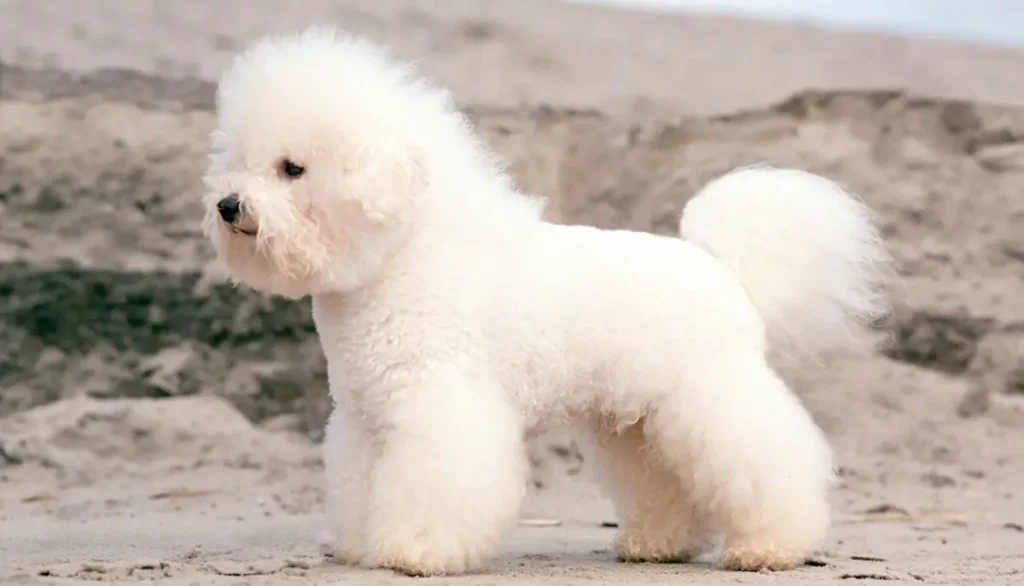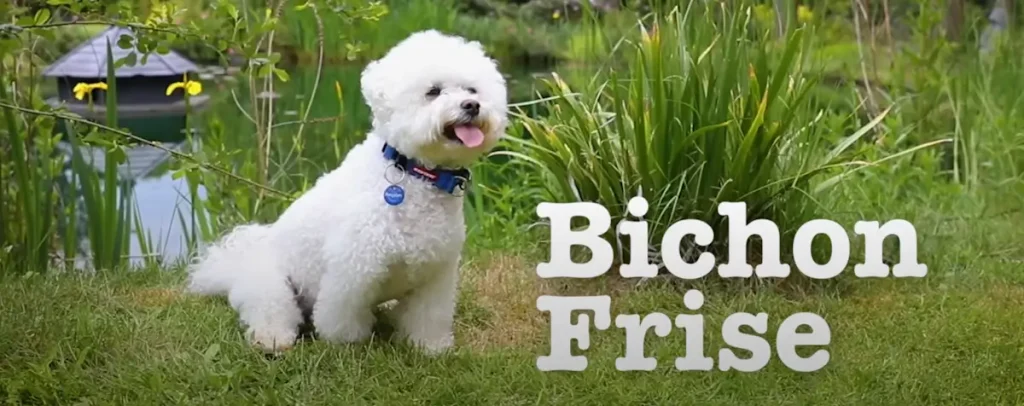As you consider the charming and charismatic Bichon Frise, their traits and temperament may captivate your heart. These petite puffballs possess a playful personality that pairs well with their plush, hypoallergenic coat—a true treasure for those with allergies.
Despite their doll-like appearance, don’t be deceived; they require regular grooming to maintain their angelic allure. Their social nature makes them an excellent addition to the family, and they bond quickly with those who show them affection and attention.
Yet, beyond the basics lies a treasure trove of tips and techniques to ensure your Bichon not only looks its best but lives a joyful and fulfilling life by your side. As you ponder the prospect of bringing one of these spirited companions into your home, consider the commitment and care they’ll need to thrive.
- Noise Level
- Energy
- Sociability
- Trainability
- Care
- Health
Overall
Summary
Moderate noise, moderate to high energy, high sociability, moderate trainability, high care requirements, and good overall health characterize the Bichon Frise.
Bichon Frise: Traits, Temperament, and Care Guide
The Bichon Frise, with its vibrant personality and distinctive curly coat, requires diligent grooming and thrives in environments full of energy and companionship. As a breed, Bichon Frises radiate joy and adaptability, perfect for active households.
Your grooming routine should include daily brushing and professional care to prevent mats. Embrace their keen learning traits; ensure their health with regular check-ups, mindful of potential issues.
Exploring the Characteristics of the Bichon Frise
Delving into the characteristics of Bichon Frises, you’ll find they are not only cheerful and intelligent but also remarkably adaptable, whether they’re brightening up an active family home or acclimating to the cozy confines of an apartment.
| Trait | Detail | Relevance |
|---|---|---|
| Curly Coat | Requires regular grooming | Essential for health & beauty |
| Adaptability | Suitable for apartment living | Ensures a happy home life |
| Trainability | Highly trainable with positive reinforcement | Facilitates bonding & behavior |
| Lifespan | 15+ years | Long-term companionship |
| Sociability | Friendly with kids & pets | Promotes a harmonious household |
Bichon Frise: A Comprehensive Profile and Guide
You’re about to get an in-depth look at the Bichon Frise, a breed known for its cheerful disposition and intelligence.
Grooming isn’t just a chore; it’s crucial for their wellbeing, requiring daily attention and professional care.
With their eagerness to learn and need for daily exercise, a Bichon Frise thrives when positive reinforcement is used in training.
Everything You Need to Know About the Bichon Frise
Embarking on the journey of understanding the Bichon Frise requires a look into their playful nature, an outline of their grooming needs, and insights into their training and health care.
- Traits: A cheerful member of the Non-Sporting Group, known for their affectionate temperament.
- Grooming Tips: Daily brushing is vital; they’re prone to certain coat issues without proper care.
- Companion Dogs: Ideal for families, thriving on companionship and love.

Discovering the Temperament of Bichon Frise
When considering the Bichon Frise breed, you’ll find a dog with a cheerful and intelligent temperament, ideal for lively homes where their adaptability and eagerness to please shine. They’re known for high energy and thrive on companionship, getting along well with children and other pets.
Be mindful that they can suffer from separation anxiety if left alone for long periods, and consistent, positive training methods are key to their well-being.
Bichon Frise: Is It a Good Fit for Families?
You’ll find that Bichon Frises are a top choice for family pets due to their affectionate nature and ability to thrive in a dynamic household. They’re well-suited for life with children and other animals, provided their need for companionship and regular grooming is met.
However, it’s crucial to consider their potential for separation anxiety and ensure your lifestyle can accommodate their social needs.
Assessing Bichon Frise’s Compatibility with Families and Kids
Considering a Bichon Frise as a family pet is an excellent choice, given their affectionate nature and compatibility with children.
- Toy Breed Adaptability: Thrives in family settings, including apartment living.
- Friendly Temperament: Gets along well with children and other pets.
- Engaging Playmate: Loves interactive play sessions, essential for families and kids.
Their need for companionship fits well with the family dynamic, ensuring a sense of belonging.
Bichon Frise Apartment Suitability
The Bichon Frise’s adaptable nature makes it an excellent choice for apartment dwellers seeking a furry companion that thrives in indoor environments. This small dog fits well in compact spaces, needing plenty of play but not prone to being noisy.
Ideal for people with allergies, Bichon Frise puppies require attention; they shouldn’t be left home alone for long. Regular grooming ensures their suitability for your apartment lifestyle.
Bichon Frise Obedience Tips
When training your Bichon Frise, it’s crucial to start with basic commands like ‘sit’, ‘stay’, and ‘come’.
Consistency and positive reinforcement, such as treats and praise, are key to ensuring they understand and follow your directions.
Effective Training Strategies for Bichon Frise
To effectively train your Bichon Frise, start by implementing positive reinforcement techniques, offering treats and praise to encourage good behavior from as early as three months of age. Address their need for companionship to avoid separation anxiety, ensuring peace of mind for both of you.
| Age to Start | Training Strategy | Expected Benefit |
|---|---|---|
| 3 months | Positive Reinforcement | Learns new tricks faster |
| Early | Manage Separation Anxiety | Reduces anxiety |
| Throughout | Regular Exercise | Maintains well-being |
Every Bichon Frise can make great companions with the right training strategies, ensuring a long lifespan of joy and belonging.
Bichon Frise Exercise and Grooming Needs
Caring for a Bichon Frise requires a commitment to daily grooming and regular professional grooming sessions. This is necessary to maintain their distinctive curly white coat. In addition to grooming, Bichon Frises also need about 30 minutes of exercise each day to stay happy and healthy. As pet parents, it is crucial to invest plenty of time in meeting these grooming and exercise needs. It is important not to leave your Bichon alone for long periods of time to prevent separation anxiety.

Health Considerations for Bichon Frise
As a Bichon Frise owner, you’ll need to stay alert to certain health issues that can affect your fluffy companion. They’re prone to conditions like diabetes and Cushing’s disease, so regular vet check-ups are crucial for early detection and management.
Investing in pet insurance can save you from unexpected costs related to chronic illnesses and necessary diagnostic tests.
Common Health Issues and Lifespan
Bichon Frises typically enjoy a lifespan of 12-15 years. However, they are susceptible to several health conditions such as diabetes and Cushing’s disease that require attentive and ongoing care. To keep your Frise happy and healthy, it is crucial to consult a vet about a special diet tailored to their needs. Regular check-ups, diagnostic tests, and considering comprehensive insurance can help manage common health issues, ensuring a generally healthy life.
Alternatives for Bichon Frise: Playful and Cheerful Small Breeds
If the Bichon Frise’s playful and cheerful personality appeals to you, consider these small breeds known for their bright demeanor and affectionate nature.
| Similar Dogs | Short Description |
|---|---|
| Maltese | A gentle and affectionate breed, known for its luxurious white coat. |
| Cavalier King Charles Spaniel | A small breed with a big heart, great for companionship. |
| Poodle | Intelligent and elegant, known for its hypoallergenic coat and playful spirit. |
| Havanese | A sociable and friendly breed with a silky coat, ideal as a family companion. |
| Shih Tzu | A lovable and affectionate toy breed, great for cuddling and companionship. |
Is Bichon Frise the Right Pet for You?
Before deciding if a Bichon Frise is the perfect addition to your family, consider whether you can meet their need for daily grooming and companionship to avoid separation anxiety.
If you’re ready to dedicate time to their care, not leaving them alone for long periods, and seeking a reputable breeder, this breed’s joyful temperament might make them the right pet for you.
Conclusion
In conclusion, as a Bichon Frise owner, you’re embracing a breed that’s not only affectionate and bright but also remarkably healthy, with a lifespan averaging 14-15 years.
Your commitment to daily grooming and mental enrichment will ensure your fluffy companion thrives.
Remember, these little charmers are more than just cuddly faces—they’re astute, adaptable, and crave interaction, making them an ideal pet for those who value an engaging and loving family member.
Frequently Asked Questions
How Should a Bichon Frise Be Groomed?
You’ll need to groom your Bichon Frise with gentle brushing techniques daily, maintaining their curly coat. Stick to regular bath routines, eye cleaning essentials, and ear care practices. Trim their nails frequently and schedule professional grooming.
What Is the Temperament of a Bichon Frise?
You’ll find that 23% of Bichon Frises excel in agility due to their playful nature and intelligent breed traits. They’re sociable, with a companionable disposition, adaptable behavior, and a cheerful attitude forming an affectionate bond.
What Are the Behavioral Characteristics of a Bichon Frise?
You’ll love your Bichon Frise’s playful antics and social interaction, but watch for separation anxiety. Their training responsiveness and adaptive intelligence shine with consistent exercise. Still, expect some obedience challenges and vocal habits.
Do Bichons Need a Lot of Grooming?
You’re in for a surprise—Bichons do need frequent grooming. Regular brushing, mat prevention, and consistent bathing keep their coat pristine. Don’t forget hair clipping, eye, ear care, nail trimming, and monitoring skin health.
